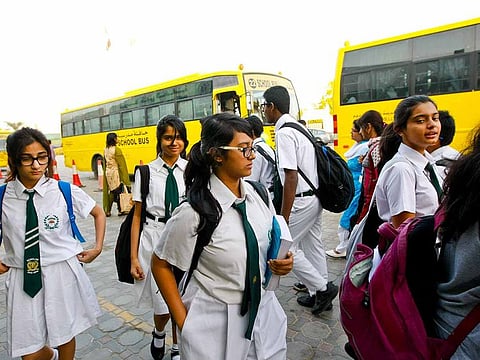UAE schools offering Indian curricula ready to implement new education policy
UAE students in Indian curricula to become independent learners

Dubai: UAE students studying in Indian-based curricula are heading for a futuristic education, one that will leave them independent of bookish learning, thanks to the new policy designed by the Indian government on Wednesday, said heads of schools in the country.

Malathi Das, principal, Global Indian School Ajman, said: “Major reforms have been introduced in the new education policy 2020. Now students will be required to take examination in Grades 3, 5 and 8 by an appropriate authority while Board Examination for Grades 10 & 12 will continue with a holistic approach,” she said.
Under the new policy, when implemented in full, assessment will be based on continuous performance with a review of knowledge and development of competencies. Vocational subjects will be introduced from Grade 6 so that students from the very beginning can experience opportunities and develop a liking for their skills from an early age. The 10 + 2 structure is replaced by 5 + 3 + 3 + 4 curricular structure. Preschool will begin from age 3 onwards.
Das said she is happy to see the policy emphasising on the need for students to learn their mother tongue. “International students have been missing this out. I am really happy this is being introduced. Imagine, Sanskrit will be offered at all levels of school excepting for Higher Education as an option for students.”

Nidhi Mishra, a Hindi teacher at Indian High School, Dubai said she was happy that policy encouraged a credit-based learning programme for Indian curriculum students in the UAE. “Indian students always had to start their courses from the scratch in the western world as they could not avail credit ratings. Now they will be on par with international curriculum students from the UAE in this respect.”
Flexible learning
Pramod Mahajan of Indian High School, Sharjah, said if implemented in full, the new policy will offer a flexible learning to UAE students following Central Board of Secondary Education (CBSE) and the Indian Certificate of Secondary Education (ICSE) curriculum. “This will make them less dependent on teachers, books and make them confident young adults to enter university learning,” he said.

“There are some very proactive steps taken by the government. There will be continuous knowledge-based learning and not something that involves mugging from the textbook and producing it on paper. The new system is a step towards encouraging student to develop skills and that will benefit their personality.”
When the policy is implemented in full, students will enjoy a lot of flexibility. “It is quite unbelievable that we will do away with the traditional physics-chemistry-biology combination. Instead students can now enjoy economics with physics, or accountancy with chemistry, or music and art with biology engineering and graphics. How great is that?,” said Mahajan.
He said the onus will lie on students to become independent learners. “I will be very happy if this happens soon as it will abolish the coaching mafia that exists today.”
Praise for internship
Mahajan commended the policy for introducing internships for students. “There are economic leaders who offers skills of different kinds. If a student loves to paint he can seek internship with a painter. He or she may not be academically literate, but may be skilfully literate. Our students will be able to mingle with them and learn a new skill.”
Mahajan said while the policy looks promising implementing it soon will be critical. Another challenge is training teachers, students into the technology based system.
Preschool advantage
Rashmi Nandkeolyar, Director and Principal, DPS Dubai, said children who attend preschool have a definite advantage in learning. “CBSE is fast-tracking Indian education into the future with their visionary policies. Children who attend preschool have a definite advantage in learning. The intermittent tests through the school years, in addition to the Board classes will ensure that students are learning and will be similar to TIMMS which tests students in grades 4 and 8. We will await the decision of the mother tongue as the medium of instruction in the primary for foreign schools, which may prove difficult to implement,” she said.
Deepika Thapar Singh, CEO-Principal of Credence High School, said there is focus on skills and capabilities instead of just marks and statements under the education revamp. “Board exams will be of low stake and the focus will be on testing concepts and knowledge application. This will ease the burden on student a great deal. Critical thinking, experiential learning, interactive classrooms, competency-based education and integrated pedagogy is what we have always been following in our school and it is heartening to see that these are the focus points of NEP too.”
De Paul Kannamthanam, Executive Director, Yardstick Educational Initiatives, said it is a giant leap in the positive direction to meet educational needs of children today, in line with international standards. “It is a paradigm shift from rote learning to conceptual understanding, individual subjects to integrated holistic learning, marks to skill based assessment.”
“Indian schools in the UAE are already well-prepared for these changes as the schools have been working towards achieving the UAE national agenda. The major challenge to the schools is the change of mentality and perspective for educators as most of us are educated in an older traditional system. Transition for the schools in UAE would be much easier than India,” said Kannamthanam.
Dr. Shivakumar D.P, CEO of JSS Group of Schools, could not agree more. “From a logistics perspective, we will be fine to adopt the changes to the policy. The challenge will be transforming the overall mentality from a traditional teaching method to one that is more creative, technology driven. But we will do it as it is for the benefit of our students.”
Revolutionary move
Punit MK Vasu, CEO, Indian High Group of Schools felt that the new NEP 2020 policy is truly revolutionary and groundbreaking. "It brings with it a range of initiatives that touch every aspect of teaching and learning across early learning to higher education including research. It refreshingly allows for critical thinking, holistic, enquiry-based, personalized and experiential learning. It is no longer a cookie cutter approach where one size fits all as the new policy allows flexibility to students in choosing streams and subjects, medium and language of instruction and even the difficultly level of an examination."

This is the first time the policy rightly focuses so much on early learning for children from ages 3 to 8 progressively based on play, discovery, and activity-based pedagogical and curricular style, he added.
Mohammad Ali Kottakkulam, Principal, Gulf Indian High School Dubai said NEP 2020 will see a paradigm shift from ‘rote memory learning’ to ‘skills and competencies’, inclusion of preprimary education and more flexibility in the learning programmes. He noted there will be less stress on students with respect to Board Exams, common entrance tests for college admissions and more. “For UAE schools, the skill & competency based teaching-learning approach will be easy as they already are practicing them in the classrooms to meet the local requirement. Three language system could be a major concern for students and parents of UAE as they already have to learn Arabic.”
Transformational
Michael Guzder, Vice President – Education, GEMS Education, said, “The new education policy of the Government of India is definitely progressive in nature and transformational in outlook. It covers all aspects from pre-school to higher education and includes the vocational aspect as well. It proposes new curricular and pedagogical structure, which augurs well for all. Above all, it is responsive and relevant to the needs and interests of learners at different stages of their development.
“These reforms were long overdue and come like a breath of fresh air. With the new assessment pattern, vocational courses on offer, credit-based learning, flexible learning and focus on technological and skills-based teaching and learning, education in India is certainly taking leaps and bounds in the right direction. This new policy has been welcomed wholeheartedly by academicians, parents and pupils alike who are all unanimous in their praise for the sweeping changes that the policy proposes. What is important, however, is the uniform understanding and implementation of the policy for it to really become the meaningful change we envision it to be.”









